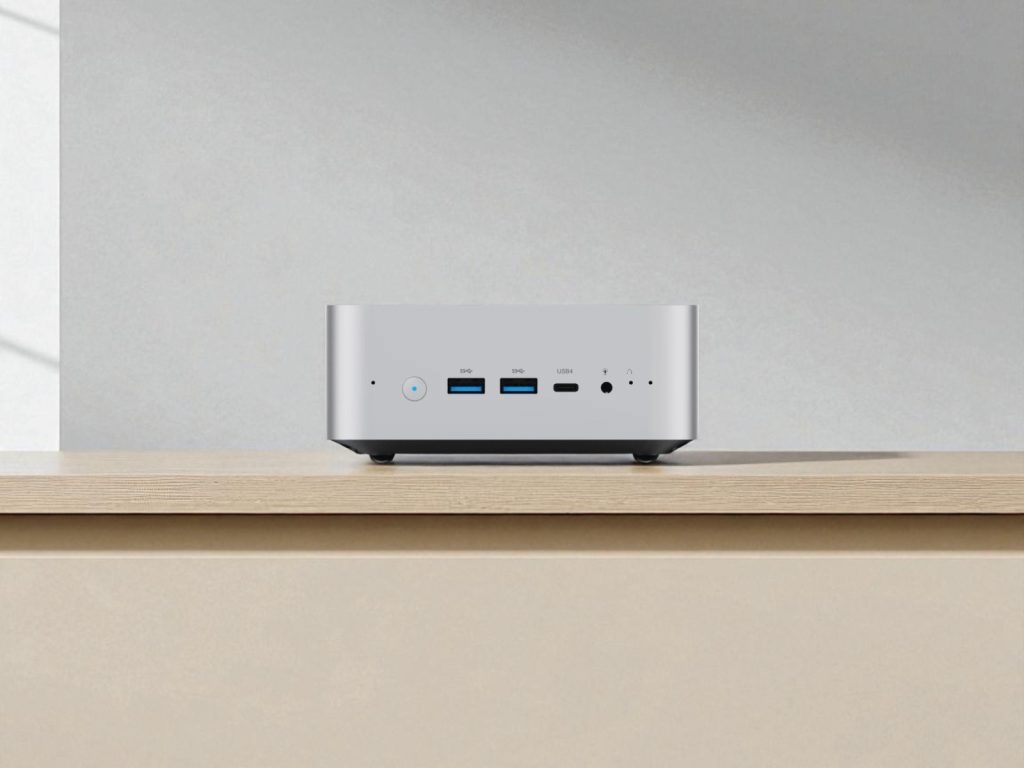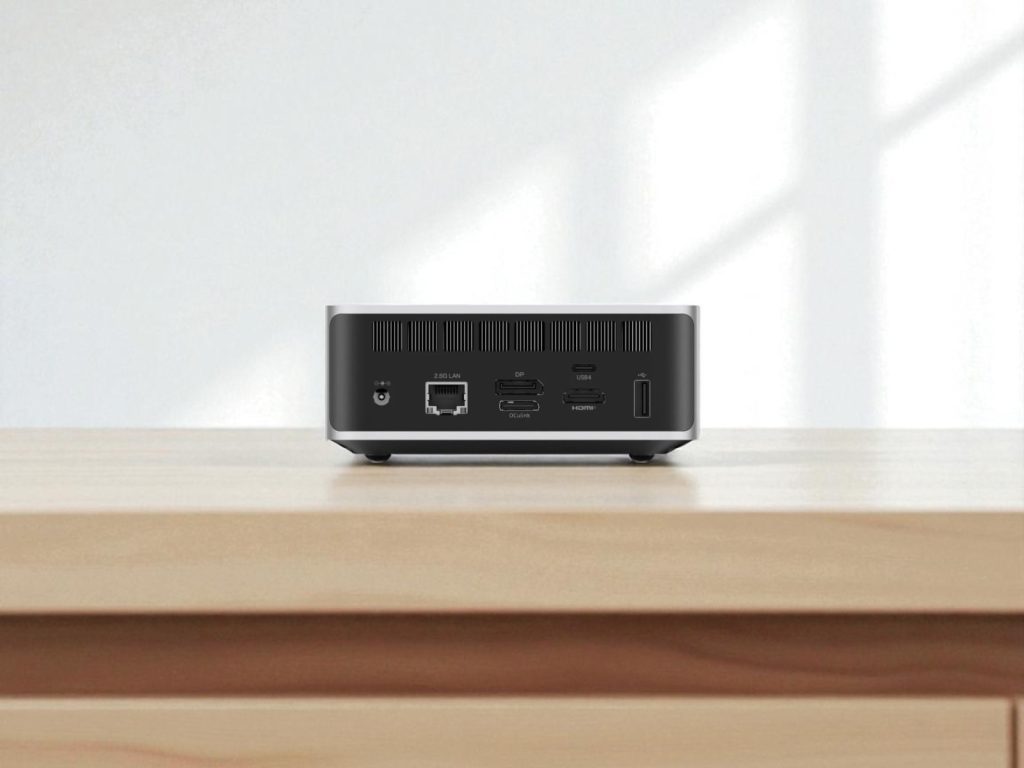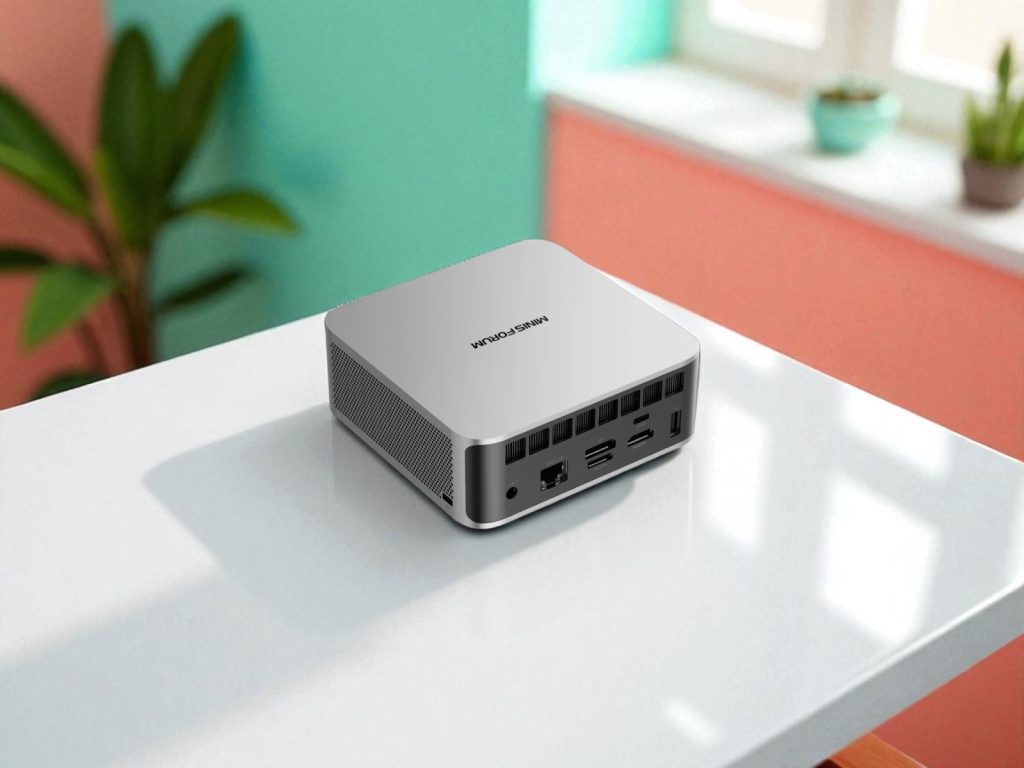After weeks of anticipation, I finally got my hands on the Minisforum AI X1 featuring the AMD Ryzen 7 255 processor, and I have some important insights to share.
The compact gaming PC market has exploded in recent years, and Minisforum continues to push boundaries with their latest offering.
However, there’s a significant caveat with this particular model that potential buyers need to understand before making their purchase decision.
Minisforum AI X1 Specifications Overview
Let me start with the core specifications of this mini PC to give you a clear picture of what you’re getting.
What is the AMD Ryzen 7 255 CPU?
Here’s where things get interesting, and it’s important to understand the distinctions.
The AMD Ryzen 7 255 isn’t actually a mainstream processor you’ll find on AMD’s global website.
In my research, I discovered this chip is essentially a rebadged AMD Ryzen 7 8745HS with some key differences that create an important distinction for potential buyers.
What I found noteworthy is that while other variants like the Ryzen 7 260 include a 16 TOPS NPU, the 255 version focuses purely on CPU and GPU performance.
This means if you’re specifically looking for a mini PC with dedicated AI hardware acceleration, it’s worth noting that this particular configuration doesn’t include those features.
CPU Performance Benchmarks
Despite the NPU consideration, I was impressed with the raw CPU performance of the Ryzen 7 255.
In Cinebench R23 single-core testing, the processor achieved a score of 1725 points, which puts it very close to competing processors in this class.
The multicore performance was equally impressive, hitting 16,180 points in the default power mode.
When it switched to performance mode in the BIOS, that score jumped to 16,997 points, showing there’s definitely thermal headroom for better performance.
Geekbench 6 testing revealed similar results, with single-core scores of 2584 and multicore reaching 12,967 points.
Design and Build Quality
I have to give Minisforum credit for the build quality of the AI X1.
The aluminum alloy case feels premium and substantial, quite different from the plastic budget mini PCs I’ve tested in the past.
However, I noticed the bottom is still plastic and does flex slightly under pressure, which seems like a cost-cutting measure.

At just 0.6kg (1.32 lbs) and measuring 128 x 126 x 52mm (5.04 x 4.96 x 2.05 inches), this is genuinely one of the most compact powerful PCs I’ve encountered.
Cooling System and Thermal Performance
I was particularly interested in how well this tiny chassis could handle the thermal demands of a powerful APU.
The cooling system uses phase-change thermal materials combined with a large fan and dual copper heat pipes.
During my testing with Cinebench running in performance mode, the maximum CPU temperature reached 92°C, which is getting quite warm but still within acceptable limits.
What impressed me more was the noise levels – even under full load, the fan noise was noticeable but not uncomfortable.
At idle, the system is essentially silent, measuring just 29 dBA in my testing environment.
Gaming Performance with Radeon 780M
The AMD Radeon 780M integrated GPU is genuinely impressive for gaming, and I spent considerable time testing various titles.
In esports titles, the performance is excellent for 1080p gaming.
Counter-Strike 2 at 1080p low settings delivered an average of 91 FPS with 1% lows of 52 FPS, which makes for a very playable experience.
Valorant performed even better, hitting 203 FPS average at 1080p low settings, though the 1% lows of 68 FPS suggest some occasional stuttering.
League of Legends at very high settings maintained 178 FPS average with much more consistent 1% lows of 141 FPS.
For more demanding titles, I found the Radeon 780M gaming performance requires some compromise.
Call of Duty Black Ops 6 at basic settings achieved 55 FPS average, which is playable but not ideal for competitive gaming.
Cyberpunk 2077 struggled more, managing only 38 FPS average at 1080p low settings, making it barely playable without upscaling technologies.
Best Mini PC for 1080p Gaming?
For 1080p gaming, I’d say this is one of the best mini PC options available, especially considering the compact form factor.
The Radeon 780M benchmarks consistently show this iGPU punching well above its weight class.
However, if you’re serious about gaming, the real strength lies in the eGPU capabilities.
OCuLink Port and eGPU Performance
The OCuLink port is probably the most interesting feature of the AI X1, but it comes with an important caveat that I wish was more clearly communicated.
I tested the eGPU performance difference between USB4 and OCuLink using an RTX 4070 Super, and the results were dramatic.
In Call of Duty Black Ops 6, USB4 delivered 87 FPS average while OCuLink achieved 126 FPS average – that’s a 45% performance improvement.
This makes the AI X1 an excellent choice for anyone planning to use an external GPU for serious gaming or content creation.
Connectivity and I/O Assessment
The port selection on the AI X1 is both impressive and limiting, depending on your needs.
On the positive side, you get dual USB4 ports capable of 40Gbps data transfer, 8K display output, and power delivery.
The rear USB4 port can accept up to 100W input, meaning you can power the entire system with a compatible USB-C charger instead of the included power brick.
Wi-Fi 7 connectivity is a nice future-proofing touch, and the 2.5 Gigabit Ethernet ensures fast wired connections.

However, I found the USB-A port selection quite limiting.
With only two USB 3.2 ports on the front and one USB 2.0 port on the rear, anyone with multiple peripherals will likely need a USB hub.
Power Consumption and Efficiency
I was impressed with the power efficiency of this system.
At idle, the AI X1 draws just 7 watts from the wall, which is excellent for a system with this level of performance.
Under maximum load in default mode, power consumption peaked at 99 watts, while performance mode pushed it to 106 watts.
The 120W external power supply provides plenty of headroom, and the ability to power via USB-C adds significant convenience for portable use.
Minisforum AI X1 vs AI X1 Pro Comparison
Many potential buyers are confused about the difference between the standard AI X1 and the Pro version.
These aren’t simply different performance tiers – they’re fundamentally different products targeting different users.
The AI X1 Pro features a much more powerful Ryzen AI 9 HX 370 processor with 50 TOPS of AI performance, compared to the 255 variant which focuses on traditional CPU and GPU performance.
The Pro model is also significantly larger at 195 x 195 x 47.5mm (7.68 x 7.68 x 1.87 inches) and weighs 1.5kg (3.31 lbs), making it more of a desktop workstation than a portable solution.
For users prioritizing portability and planning to use an eGPU, the standard AI X1 makes more sense.
If you need maximum built-in performance and actual AI capabilities, the Pro is worth the extra investment.
Minisforum AI X1 Alternatives
The mini PC market is highly competitive, and several alternatives deserve consideration.
Beelink GTR7 vs Minisforum AI X1
The Beelink GTR7 Pro offers similar AMD Ryzen performance but typically runs at higher sustained power levels, potentially offering better performance in extended workloads.
However, it lacks OCuLink connectivity, limiting eGPU performance to USB4 speeds.
Geekom A7 vs Minisforum AI X1
The Geekom A7 review feedback suggests it offers premium build quality with excellent aesthetics but can suffer from thermal throttling.
Like the Beelink, it also lacks OCuLink for optimal eGPU connectivity.
For users prioritizing future eGPU upgrades, the AI X1’s OCuLink advantage is significant.
Content Creation and Productivity Performance
I tested several creative applications to assess the AI X1’s suitability for content creation work.
Adobe Photoshop performance was excellent, with the system scoring 7856 points in PugetBench testing.
This significantly outperformed lower-power U-series processors, making it genuinely capable for photo editing workflows.
Adobe Premiere Pro showed even more impressive results, scoring 3412 points – more than double what typical U-series chips achieve.
Video encoding performance was solid, with H.264 software encoding completing a test file in 98 seconds.
AV1 hardware encoding using the Radeon 780M took 86 seconds, showing efficient use of the integrated graphics for video workflows.
Storage Performance and Expansion
The included Kingston NVMe drive performance was somewhat disappointing in my testing.
3DMark storage benchmark results showed a score of only 1337, which is among the lowest I’ve seen for a PCIe Gen 4 drive.
I suspect this is partly due to thermal issues, as I noticed the factory forgot to remove the protective plastic from the thermal pads.
The dual M.2 2280 slots support up to 8TB total storage when both are used for SSDs.
However, remember that using OCuLink reduces you to a single internal drive.
Who Should Buy the Minisforum AI X1?
Based on my extensive testing, I can recommend this mini PC for specific user profiles.
Ideal Buyers
The AI X1 is perfect for users who want a compact gaming PC with excellent upgrade potential.
If you’re planning to use an eGPU in the future, the OCuLink connectivity makes this one of the best mini PC for gaming options available.
Content creators who need strong CPU performance for video editing will appreciate the 8-core processor and hardware encoding capabilities.
Anyone with severe space constraints who still needs desktop-class performance will love the compact design.
Who Should Avoid This Model
If you’re specifically interested in AI capabilities, it’s worth noting that this 255 variant doesn’t include dedicated AI acceleration hardware.
For AI-focused tasks, you’ll want to consider the 260 model or the AI X1 Pro with its more powerful NPU.
Users with many USB peripherals will find the limited port selection frustrating.
If you need maximum internal storage capacity, the OCuLink trade-off might not be worth it.
Minisforum AI X1 Price and Value Assessment
At $439 for the barebone configuration, the AI X1 offers compelling value for the performance level.
The configured models with 32GB RAM and 1TB SSD start around $599, which becomes less competitive when you can build a similar system with better components yourself.
I’d recommend the barebone model for most users, allowing you to choose your own RAM and SSD for better price-performance.
Pros and Cons Summary
Pros
- Excellent 8-core CPU performance for productivity and multitasking
- Strong Radeon 780M gaming performance for 1080p gaming
- OCuLink port provides superior eGPU upgrade path
- Incredibly compact and portable design
- Dual USB4 ports with power delivery support
- Wi-Fi 7 and 2.5G Ethernet connectivity
- Excellent value in barebone configuration
- Quad-display capability
Cons
- No dedicated NPU for AI acceleration in the 255 variant
- Limited USB-A port selection requires hub for multiple peripherals
- OCuLink requires sacrificing one M.2 SSD slot
- Included SSD performance is below expectations
- Factory thermal pad installation issues
- Limited Bluetooth range
- Can reach high temperatures under sustained loads
Frequently Asked Questions
Is the Minisforum AI X1 good for gaming?
Yes, the Radeon 780M provides excellent 1080p gaming performance in esports titles and decent performance in AAA games at lower settings.
The OCuLink port also makes it one of the best options for future eGPU upgrades.
What is the AMD Ryzen 7 255 CPU?
The Ryzen 7 255 is essentially a rebadged AMD Ryzen 7 8745HS with the NPU disabled.
It offers 8 cores and 16 threads with Zen 4 architecture but doesn’t include dedicated AI acceleration hardware.
Does the Minisforum AI X1 overheat?
The AI X1 reaches maximum temperatures of 92°C under sustained loads, which is warm but within acceptable limits.
The cooling system maintains stable performance without significant thermal throttling.
How much does the Minisforum AI X1 cost?
The barebone model starts at $439, while configured systems with RAM and SSD range from $599 to $687 depending on specifications.
What are the best alternatives to the Minisforum AI X1?
Key alternatives include the Beelink GTR7 Pro and Geekom A7, though neither offers OCuLink connectivity for optimal eGPU performance.
Can the Minisforum AI X1 run Cyberpunk 2077?
Yes, but performance is limited to around 38 FPS at 1080p low settings with the integrated graphics.
An eGPU via OCuLink would dramatically improve performance for demanding games.
Is the Minisforum AI X1 Pro better than the AI X1?
The AI X1 Pro offers significantly more performance and actual AI capabilities with its 50 TOPS NPU, but it’s larger and heavier.
Choose the Pro for maximum built-in performance, or the standard AI X1 for portability and eGPU expansion.
What is an OCuLink port?
OCuLink is a high-bandwidth connector that provides a direct PCIe 4.0 x4 connection for external GPUs, offering superior performance compared to USB4-based eGPU solutions.
Does the Minisforum AI X1 have an NPU?
The 255 variant doesn’t include an NPU, while the 260 model includes a 16 TOPS NPU for AI acceleration.
Can you upgrade the Minisforum AI X1?
Yes, you can upgrade RAM up to 96GB and install up to two NVMe SSDs, though using OCuLink requires sacrificing one SSD slot.
How to power Minisforum AI X1 with USB-C?
The rear USB4 port supports 100W Power Delivery input, allowing you to power the system with a compatible USB-C charger instead of the included power brick.
What is the difference between Ryzen 7 255 and 260?
The main difference is that the 260 includes a 16 TOPS NPU for AI acceleration, while the 255 focuses on traditional CPU and GPU performance.
CPU performance is very similar between the two models.
Is the Radeon 780M good for video editing?
Yes, the Radeon 780M provides excellent hardware acceleration for H.264 and HEVC encoding, making it capable for 1080p and even 4K video editing workflows.
Minisforum AI X1 power usage?
Power consumption ranges from 7W at idle to 99W under full load (106W in performance mode), making it quite efficient for the performance level.
Conclusion
After extensive testing, I have nuanced thoughts about the Minisforum AI X1 with Ryzen 7 255.
On one hand, it’s genuinely one of the most impressive compact gaming PCs I’ve tested, offering desktop-class performance in an incredibly small package.
The OCuLink connectivity sets it apart from competitors and provides an excellent upgrade path for serious gaming.
However, it’s important for buyers to understand that this particular variant doesn’t include dedicated AI acceleration hardware, which may be a consideration for some users.
If you understand what you’re getting – a powerful, compact PC focused on traditional performance with excellent eGPU potential – the AI X1 255 offers compelling value at $439 barebone.
For users specifically wanting AI capabilities, I’d recommend considering the 260 variant or the AI X1 Pro instead.
Despite the AI hardware considerations, this remains one of the best mini PC options for compact gaming and productivity, especially for users planning future eGPU upgrades.
The combination of strong CPU performance, capable integrated graphics, and future-proof connectivity makes it a solid choice for the right user.



